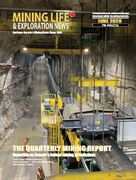This year Glencore’s Kidd Operations are marking 50 years of production

Kidd Operations this year are celebrating 50 years of production in the City of Timmins.
In the last five decades, the Glencore-owned organization mined over 150 million tonnes of ore and employed over 17,000 people, including multi-generational families.
It is celebrating this milestone with its employees, retirees, business partners and the community throughout the year.
Kidd Operations include the Kidd Mine and Kidd Concentrator.
The Kidd Mine produces an average of 40,000 tonnes of copper and 70,000 of zinc annually and is the world’s deepest base-metal mine below sea level reaching 9600 feet. The mine also has the longest surface-to-bottom ramp in the world. It transports its ore by rail to the Kidd Concentrator/Mill located 27 km from the mine and is one of the largest private-sector employers in the City of Timmins with a workforce of approximately 850 including full-time employees and contractors.
To meet the challenges of deep mining, Kidd employs a highly skilled workforce and uses leading edge technology such as automated loaders and ventilation-on-demand.
The company says “with a constant focus on achieving zero harm, we are committed first and foremost to safety, the development of our people, and the sustainability of our community and environment.
On Nov. 8, 1963, diamond drill hole K55-1 launched the greatest ore body discovery in Timmins at the time—the Kidd Creek ore body which is recognized as one of the world’s largest massive sulphide deposits.”
This discovery core brought up Nov.9 brought economic revitalization to the then Town of Timmins and a renewed optimism in the future of the community.
Glencore and its predecessors have been mining the Kidd Creek copper/zinc deposits since 1966.
In 2011, a $148 million (CA) mine-deepening project was completed and Kidd currently mine at 9600 feet with shaft bottom at 9889 feet.
Extracting ore at 3km below the earth’s surface requires the development and application of innovative processes, methods and technologies that are unique in the global mining sector:
• Cold stope system decreases temperatures at lower levels, and reduces electricity consumption and greenhouse gas emissions;
• Automated scoop trams increases safety and productivity;
• Some of the world’s largest vent fans provide ventilation-on-demand;
• One of the largest fibre optic infrastructures in Northern Ontario is used to communicate and remotely operate equipment 3km underground.
In addition, Kidd regularly hosts and shares deep mining data with international research bodies, academics and private technology/product developers.
The company sees sustainability as being integral to how it does business in the community.
It says “we recognise that our work can have an impact on society and the environment.
We are committed to continuously improving our performance in health and safety, environmental protection, compliance, and community engagement.
Our number one priority in the workplace is to protect the health and well-being of all our workers.
We take a proactive approach to health and safety and we are committed to ensuring continuous improvement in the prevention of occupational disease and injuries.”
Kidd’s efforts towards achieving Zero Harm has made its workplace one that is recognized across Canada for its commitment to safety as evidenced by a number of awards:
• 2012 John T. Ryan National Safety Trophy for Metal Mines (awarded to Kidd 11 times since 1975);
• 2013 Workplace Safety North President’s Award;
• 2013 District Winner - Timmins and District Mine Rescue Competition;
• 2013 Provincial Winner - All Ontario Mine Rescue Competition
• 2015 Workplace Safety North President's Award.
Kidd says “our environmental management starts with our commitment to sustainable development and to our core business values:
We aim to preserve the long-term health, function, and viability of the natural environments affected by our operations.
All significant potential risks and actual impacts of our activities and operations on the environment are identified, analyzed, and eliminated or otherwise treated and controlled.
Our Environmental Management System is used to systematically manage these risks and promote continuous improvement.
Some significant environmental activities include air emissions, water consumption and treatment, waste management including mine rock and tailings, conservation of energy and reduction in greenhouse gas emissions, progressive land rehabilitation, as well as spill prevention and preparedness.
We also maintain a biodiversity monitoring and enhancement program to ensure zero harm to species at risk that may be affected by our operations.
In 2014, we were recognized for our reclamation of the Jarosite Pond and Three Nations Creek at the former Metallurgical site with the Tom Peter's Award.
A green field is the site of the former Jarosite Pond. Today, moose, bear and other wildlife come to the area.
Parent Glencore plc headquartered in Switzerland produces and trades more than 90 commodities derived from natural resources. In 2015, it operated in 50 countries, had around 160,000 employees and contractors and revenues of $172.7 billion.
Earnings before interest and taxes were $2.17 billion.
It trades in and distributes physical commodities sourced from third party producers as well as its own production. It also provides financing, processing, storage, logistics and other services to commodity producers and consumers.
To receive a copy of the Kidd 50 Year Souvenir Publication please contact Audrey Guindon, publications manager @ 705.264.2251 and a copy will be mailed to you.

|